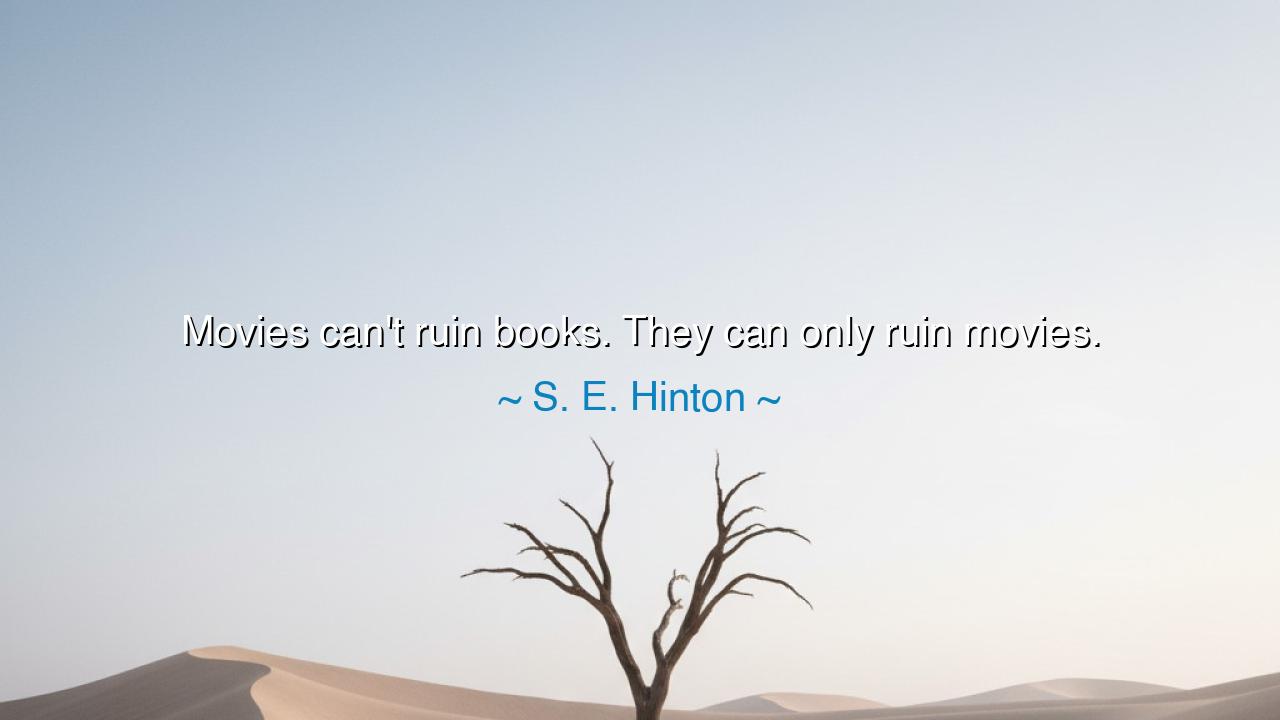
Movies can't ruin books. They can only ruin movies.






Hear now the words of S. E. Hinton, whose wisdom on the relationship between books and movies speaks to the heart of both creation and adaptation: "Movies can’t ruin books. They can only ruin movies." In these simple words, there lies a profound understanding of the nature of art, the power of literature, and the limitations of cinema. Hinton reminds us that while books can stir the soul and shape the mind in ways that transcend the visual, movies, bound by their form, can never truly ruin the essence of a book. Rather, they are limited by their own nature and, when forced to adapt, may falter in conveying the depth and complexity that the written word offers so freely.
In the ancient days, the bards would weave their stories in the air, and the oral traditions of the time were shaped not by the visual, but by the spoken word. The Greeks, through their epic poets like Homer, believed in the power of stories to endure through time. The tales of Achilles, Odysseus, and the Trojan War were passed down, not in film or stone, but through the memory and imagination of those who heard them. These stories, though not bound by the restrictions of physical representation, endured—for they lived not in images but in the hearts and minds of the listeners. Just as the ancient stories were not confined to their initial telling, so too can books continue to live on beyond the fleeting forms of movies.
Consider the tale of Virgil, whose Aeneid tells of the journey of Aeneas after the fall of Troy. This epic, though shaped by Virgil's vision, would never be fully contained in any one form. The story of Aeneas lived beyond the poem itself, passing through the ages, resonating in the hearts of those who read it, who understood it, and who reimagined it. And though many have tried to adapt the Aeneid into plays, films, and other forms, it is the written word that remains the most powerful conduit for its true essence. Hinton’s insight into the relationship between books and movies reflects this same truth—that the written word can never be ruined by any adaptation, for its soul lies in the imagination of the reader, not in the fleeting images of a film.
Think, too, of the great Shakespeare, whose plays have been adapted into countless movies and productions. Many have tried to capture the essence of his works, yet no adaptation can ever match the power of the original text. While cinema may attempt to bring his words to life through images, it is in the language, the emotion, and the depth of the play that Shakespeare’s genius truly resides. Like the epics of old, his works cannot be ruined by movies, for they live on in the spirit of the language itself. Hinton’s words remind us that while movies may capture only a portion of the experience, books retain their essence, untouched by the limitations of any form of adaptation.
Now, O wise ones, consider the lesson that Hinton imparts. The power of a book lies in its ability to stir the soul, to create a world in the reader’s mind that cannot be reduced to a single image. Movies, by their nature, are visual, concrete, and fleeting; they can never encapsulate the vastness of a novel, the depth of its characters, or the richness of its themes. To say that a movie can ruin a book is to misunderstand the nature of literature. Books are living things, breathed into existence by the reader’s imagination, and no adaptation—no matter how grand—can ever take that away. The power of a book is infinite, whereas the power of a movie, though potent, is limited by time and space.
Thus, let this truth guide you, O future generations: never underestimate the power of the written word. Movies, though they may be glorious and captivating, are but a shadow of the richness that exists in literature. Like the ancients, who passed down their stories not in stone, but in the minds of their people, the stories of today will continue to live, not in their adaptations, but in the hearts of those who read them. Adaptations may enrich, but they can never replace the essence of the book. Let the written word be your guide, your constant source of inspiration, for it is in the pages of a book that the true power of a story resides.
As you move forward, O creators and seekers of wisdom, remember that the books you read are not just stories; they are gateways to the infinite realms of the human spirit. Whether in movies, plays, or other forms of art, do not limit your experience to what you see. Seek the deeper truths that lie within the written word, for it is in that space, between the lines and in the spaces of your mind, that the true meaning of a story comes alive. Like Hinton, understand that while movies may attempt to bring a story to life, it is books that will always carry the essence of what it means to be human.






AAdministratorAdministrator
Welcome, honored guests. Please leave a comment, we will respond soon